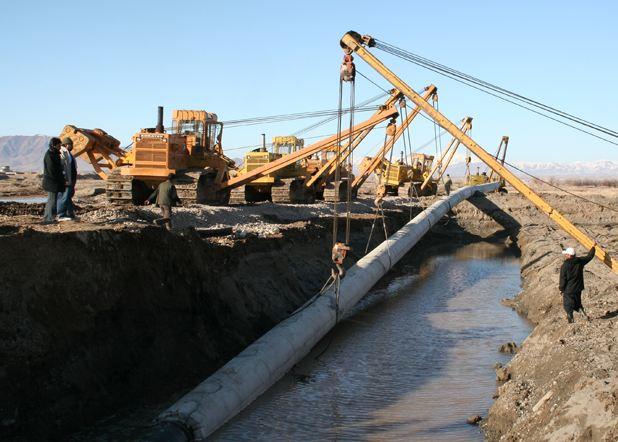
INDIA & CHINA COMPETITION

Anyone looking for the biggest immediate impact from Iran's nuclear deal may want to turn away from the Middle East and toward the Indian subcontinent.
With US sanctions easing, India is racing to build a port in Iran that will get around the fact that its land access to energy-rich former Soviet republics in Central Asia has been blocked by China and its ally Pakistan.
"We're seeing the latest manifestation of the Great Game in Central Asia, and India is the new player," said Michael Kugelman, a South Asia expert at the Washington-based Woodrow Wilson International Center for Scholars. "It's had its eyes on Central Asia for a long time."
While the world focuses on what Iran's opening means for Israel and Arab nations, the ramifications are also critical for Asia. Closer Iran-India ties would allow New Delhi's leaders to secure cheaper energy imports to bolster economic growth and reduce the influence of both China and Pakistan in the region.
The six nations that make up Central Asia hold at least 11% of the world's proven natural gas reserves, as well as substantial deposits of oil and coal, according to data compiled by BP. Afghanistan says its mineral wealth is valued at $1 trillion to $3 trillion.
"Iran can offer us an alternative route to Central Asia," said India's foreign secretary S. Jaishankar. "The resolution of the nuclear dispute and lifting of sanctions will allow our agenda of energy and connectivity cooperation to unfold seriously."
'Alternative Route'
India can be the first country to benefit from the deal in Asia, an Iranian diplomat told reporters in New Delhi this week. Iran was seeking billions of dollars in investment from India for ports, railways and airports, the diplomat said, asking not to be identified due to government rules.
Even before the deal to end sanctions was clinched, India reached an agreement to upgrade the Iranian port of Chabahar on the Arabian Sea. Two Indian state-run companies -- Jawaharlal Nehru Port Trust and Kandla Port Trust -- have plans to invest $85 million to upgrade two berths.
On a five-nation Central Asian tour last month, Prime Minister Narendra Modi backed an ambitious transit route through Iran that would effectively connect Europe to India by a series of sea, rail and road links. Currently, cargo from India has to go by air or take a detour through the Suez Canal.
Pathway to Europe
In a dry run on the alternative routes last August, the results showed that transit time from India's financial capital of Mumbai could be more than halved to as short as 16 days and would slash costs by 70%.
Other plans are just as bold: A 900-kilometer (560 mile) railway would link the Iranian port to a part of Afghanistan where a group led by Steel Authority of India holds rights to an $11 billion iron ore mine. Modi has proposed re-routing a Turkmenistan-India project through Iran, and his oil minister is reviewing a proposal for an undersea pipeline from India to Chabahar port.
"India isn't energy insecure -- it's surrounded by oil and gas," said Subodh Kumar Jain, director of South Asia Gas Enterprise, the company behind the proposed $4.5 billion undersea pipeline. "The challenge is geopolitical, not technical or financial."
China Dominance
China is the biggest economic player in Central Asia. It's the top commercial partner for every nation except Afghanistan, with its $48 billion in trade to the region dwarfing that of India, according to data compiled by Bloomberg. Turkmenistan pipes almost 80% of its gas to China.
China has welcomed the nuclear deal, noting in a statement that Iran once played a pivotal role in the ancient Silk Road trade route linking Europe and the Far East.
Pakistan is also important. The only Muslim-majority country with a nuclear bomb has refused to allow Indian trucks to pass through to Central Asia, and plans to build overland gas pipelines from Iran and Turkmenistan had long stalled.
"Pakistan has essentially had a stranglehold over India's policy in the region," said Harsh V. Pant, a professor of international relations at King's College London. "India wanted to break that. Now, that constraint has been removed."
Even so, Pakistan doesn't see much of a threat, according to Commerce Minister Khurram Dastgir Khan. China is investing $45 billion in an economic corridor through Pakistan stretching from China's western border to the Arabian Sea. Pakistan is also seeking a free-trade agreement with Iran.
Catching Up
"The scale of Chinese investment in Pakistan and in the corridor really dwarfs anything Indian is attempting in Iran," Khan said in an interview in Islamabad on Wednesday.
Iran and India's historical links date back to antiquity, when Indus Valley merchants plied across routes to Mesopotamia. Persian artists sculpted the Mughal architecture of India's north, influencing structures such as the Taj Mahal.
More recently, India was one of Iran's top oil buyers before international sanctions were tightened several years ago.
"As always, India will be playing catch up," Kugelman said. "It sees itself in a race with China, and it simply doesn't want to fall that far behind."
gasprocessingnews.com
-----
More:
IRAN OIL UP 13%
CHINA'S GAS MEGA-PROJECT
INDIA BUY US LNG
UNDEFINITE PIPELINE
LNG MARKET: TRENDS AND OUTLOOK





